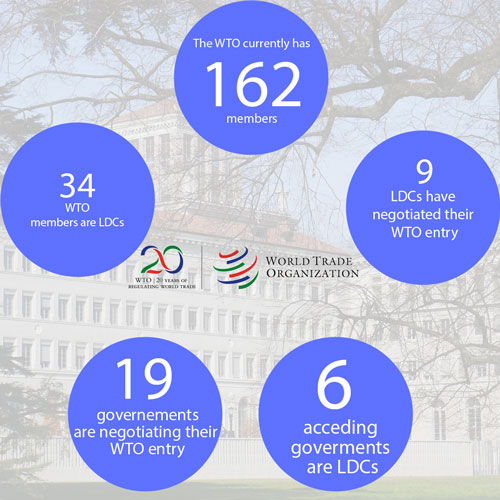
DÉCIMA CONFERENCIA CONFERENCIA MINISTERIAL, NAIROBI 2015
Briefing note: WTO accessions
The package of rights and obligations that comprise the WTO membership terms for Liberia and Afghanistan will be presented to ministers in Nairobi for a formal decision on the countries’ accessions to the WTO. These formal decisions follow on from the decisions taken ad referendum by WTO members on the terms of Liberia’s (6 October) and Afghanistan’s (11 November) WTO membership. Agreement by ministers in Nairobi will pave the way for two more least-developed countries (LDCs) to join the organization and will bring to nine the number of LDCs which have acceded to the WTO since 1995.
Actualización: noviembre de 2015
ESTAS EXPLICACIONES se facilitan para ayudar al público a entender las actividades de la OMC. Si bien se ha hecho todo lo posible por que el contenido sea exacto, las explicaciones no afectan a las posiciones los gobiernos Miembros.
> Las Conferencias Ministeriales
> Conferencia Ministerial de Nairobi
> Otras notas informativas
Since the WTO was created in 1995, the process of accession to the organization is spelled out in Article XII of the Marrakesh Agreement, the accord which established the WTO. Terms of membership have to be agreed by the acceding government and WTO members.
Currently, 19 governments are negotiating their WTO accession. Six of these are LDCs (Bhutan, Comoros, Equatorial Guinea, Ethiopia, Sao Tomé & Principe and Sudan).
Thirty-six WTO members have negotiated their WTO entry since 1995. Out of the original 48 LDCs on the United Nations list, 34 are WTO members. Nine of these have negotiated their membership terms since 1995.

Any state or customs territory having full autonomy to conduct its trade policies can apply for WTO membership. The process starts when the applicant government submits a formal written request for accession to the WTO Director-General. The General Council considers the request and, on the basis of consensus, establishes a Working Party — open to all WTO members — to examine the request.
The Working Party meets to examine all aspects of the applicant government’s trade and legal regime through questions posed by WTO members and replies by the applicant government.
Through multilateral and plurilateral negotiations, the Working Party determines the terms and conditions of entry for the applicant government. These include commitments to observe WTO rules and disciplines upon accession and transitional periods to make any legislative or structural changes where necessary to implement these commitments.
At the same time, the acceding government engages in bilateral negotiations with interested Working Party members on concessions and commitments on market access for goods and services.
The results of the multilateral, plurilateral and bilateral phases outlined aboveare consolidated and included inthe final “accession package”, containing:
- a report of the Working Party containing a summary of proceedings and conditions of entry and a “Protocol of Accession”
- “schedules” of market access commitments in goods and services agreed between the acceding government and WTO members.
The “accession package” is adoptedat a final formal meeting of the Working Party, before being presented to the General Council or the Ministerial Conference for adoption. Once this is completed, the Protocol of Accession goes through the domestic ratification procedures of the acceding government. Thirty days after having deposited the instrument of acceptance with the WTO Director-General, the acceding government becomes a WTO member.
Accession: This is the process ofbecoming a member of the WTO, and signing on to its agreements. New members have to negotiate terms bilaterally with individual WTO members and multilaterally to ensure (1) the results of the bilateral negotiations apply to all WTO members, and (2) required legislation and institutional reforms meet WTO obligations.
Ad referendum: For further consideration by a party or parties having the authority to make a final decision.
Working Party: Group of WTO members negotiating multilaterally with a country applying to join the WTO.
Working Party report: Final document passed on to the General Council for approval, covering the applicant country’s commitments on opening its markets and on applying WTO rules.
Protocol of Accession: Document to be ratified by the competent authority of the acceding government, usually the Parliament. It confirms the acceding government’s WTO membership terms.
Instrument of Acceptance: Document in which the acceding government declares that the Protocol of Accession has been ratified by the competent national authority. Once it is signed and deposited with the WTO Director-General, the acceding government becomes a WTO member after 30 days.
Plurilateral: In the WTO, involving some members. See “multilateral”.
General Council: The WTO’s highest-level decision-making body in Geneva, meeting regularly to carry out the functions of the WTO. It has representatives (usually ambassadors or equivalent) from all WTO members and has the authority to act on behalf of the Ministerial Conference which only meets about every two years.
Ministerial Conference: The top decision-making WTO body. It meets about every two years at the level of ministers in any city of a WTO member.